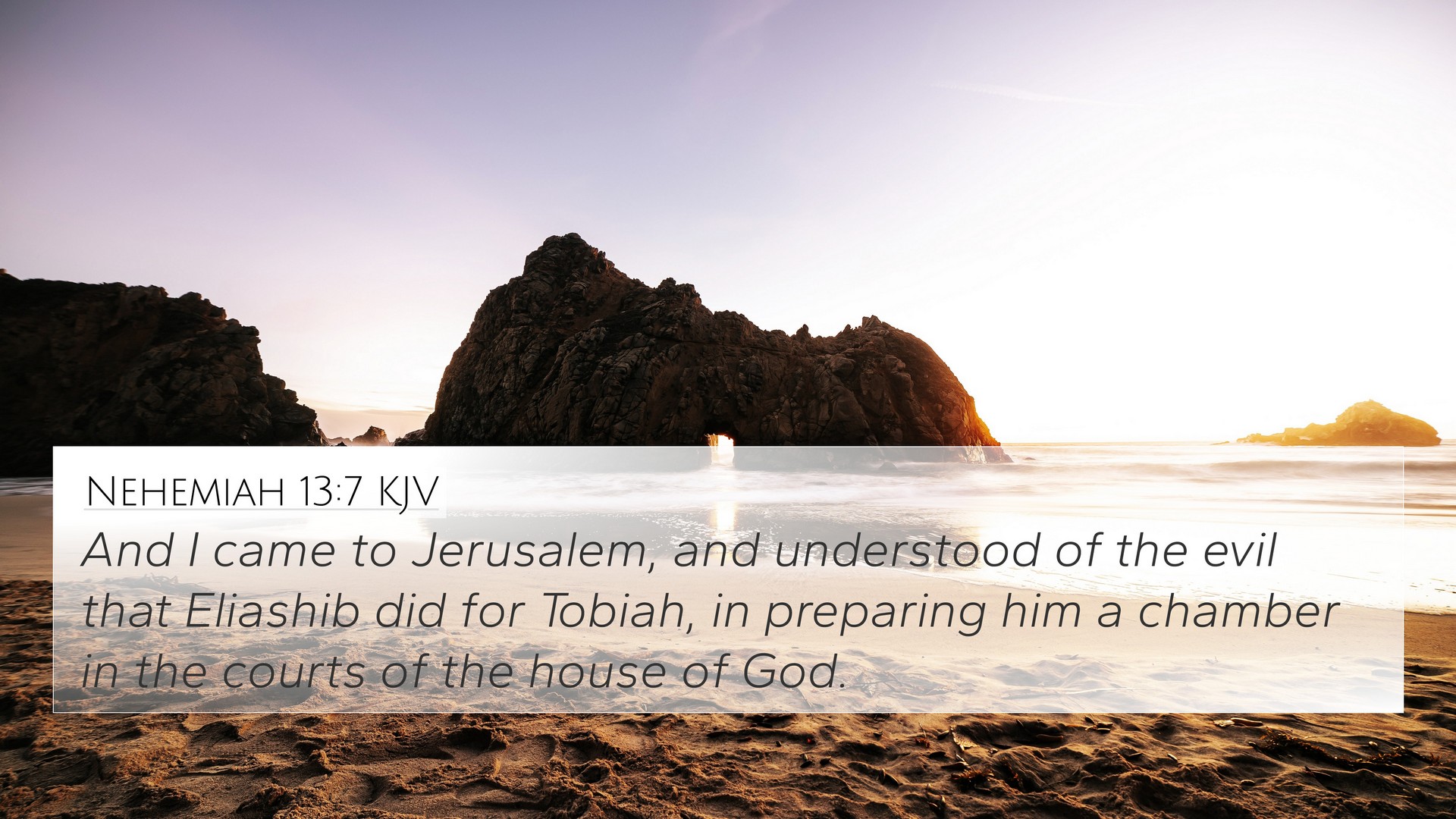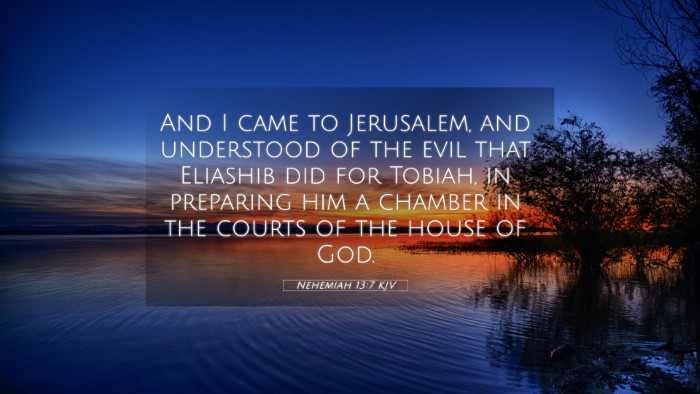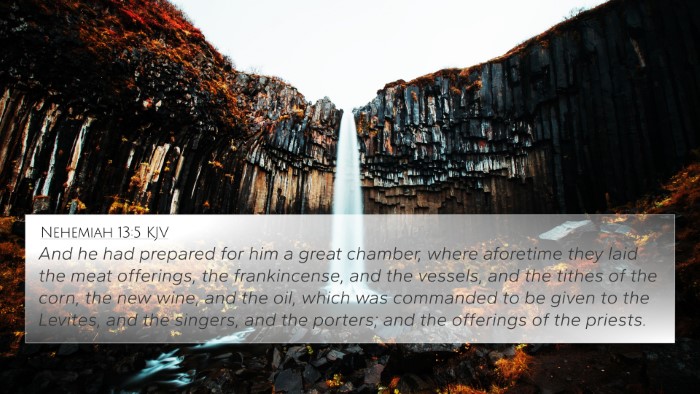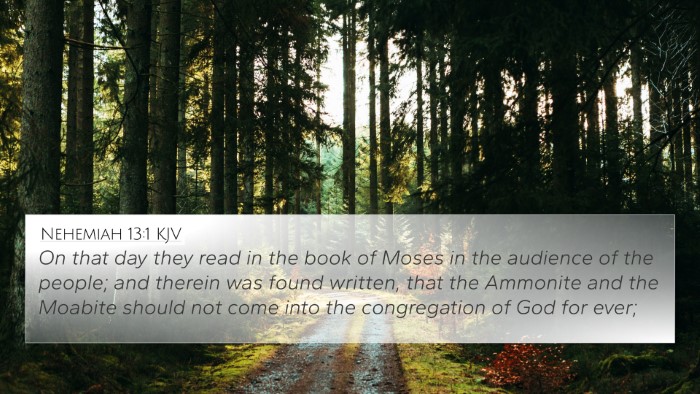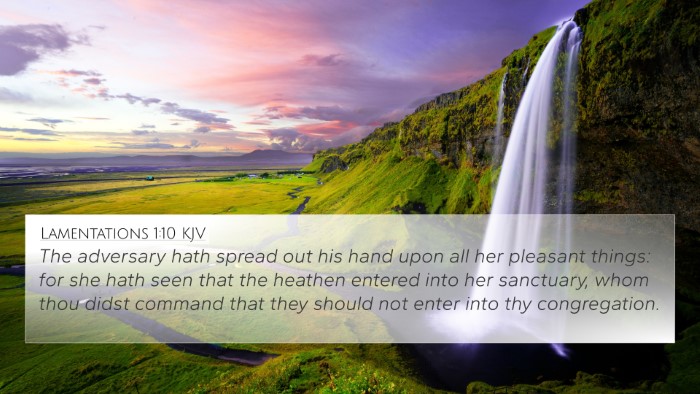Understanding Nehemiah 13:7
Bible Verse: Nehemiah 13:7 - "And I came to Jerusalem and understood of the evil that Eliashib did for Tobiah, in preparing him a chamber in the courts of the house of God."
Summary of the Verse Meaning
This verse highlights the betrayal and corruption that occurred within the leadership of the Jewish community during the time of Nehemiah. Eliashib, the high priest, had accommodated Tobiah, a known enemy of the Jews, by giving him a chamber in the temple. This act signifies a grave disregard for the sanctity of God's house and illustrates the ongoing struggle between loyalty to God's commandments and the temptations of worldly alliances.
Commentary Insights
-
Matthew Henry:
Henry emphasizes the shocking nature of Eliashib's actions, highlighting that it indicates a profound moral decline. Nehemiah’s discovery of this situation illustrates the need for vigilance against corruption and the compromise of spiritual integrity. Henry notes that the temple, intended for worship and reverence, had become a place of compromise.
-
Albert Barnes:
Barnes elaborates on the significance of Eliashib's role as high priest, suggesting that such an accommodation to an enemy within the temple is contrary to the divine standards set out in the Law. He explains that this act not only disgraced the priesthood but also posed a threat to the religious purity of the people.
-
Adam Clarke:
Clarke provides a historical context, detailing the relationship between Jews and Tobiah. He discusses how Tobiah's presence in the temple indicates a serious breach of faith and loyalty to God’s commands, effectively filtering secular alliances into sacred spaces, which should have remained pure and untouched by outside influences.
Cross References
Nehemiah 13:7 connects deeply with various passages throughout the Bible. The following are notable cross-references:
- Ezra 4:1-2: Discusses the opposition faced by the Jews and the need for separation from foreign alliances.
- Nehemiah 2:10: Mentions Tobiah’s antagonism toward the rebuilding efforts in Jerusalem.
- Ezra 10:10-11: Urges Israelites to repent from their sins of compromise with foreign entities.
- Malachi 1:7: Condemns improper offerings and the profaning of God's altar as a warning against complacency.
- Isaiah 52:11: Encourages God's people to separate themselves from unclean influences.
- 1 Corinthians 5:11: Adds New Testament insight on maintaining purity within the church community.
- James 4:4: Declares friendship with the world as enmity toward God, reinforcing the theme of separation.
Thematic Interpretations
This passage prompts several important themes that emerge in both the Old and New Testaments:
- Corruption of Leadership: Many biblical instances call for a scrutiny of leaders who lead followers astray.
- Holiness of Worship Spaces: The sanctity of places designated for worship must be preserved against secular encroachments.
- Divine Standards vs. Worldly Alliances: The struggle to maintain fidelity to divine commands against societal pressures is a recurring biblical narrative.
- Repentance and Restoration: The necessity for communal and personal repentance when straying from God's instructions.
Practical Applications
As you reflect on Nehemiah 13:7, consider how this passage applies to modern worship and community practices:
- Are there influences in your life that compromise your spiritual integrity?
- How can your local church ensure that its space and mission remain focused on God’s purpose?
- In what ways can you uphold divine standards in your community without succumbing to external pressures?
Concluding Thoughts
Nehemiah 13:7 reflects the ongoing battle between fidelity to God and the alluring nature of worldly alliances. It serves as a timeless reminder of the importance of maintaining purity in worship and vigilance in leadership. The connections drawn from this verse to others across the biblical narrative deepen our understanding of God’s call for holiness and integrity among His people.
